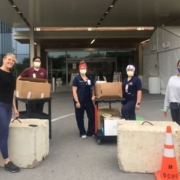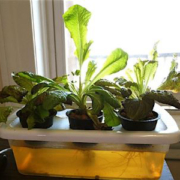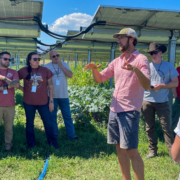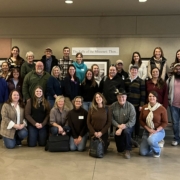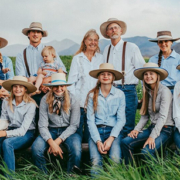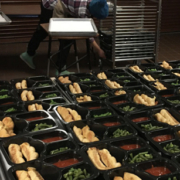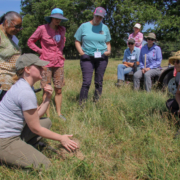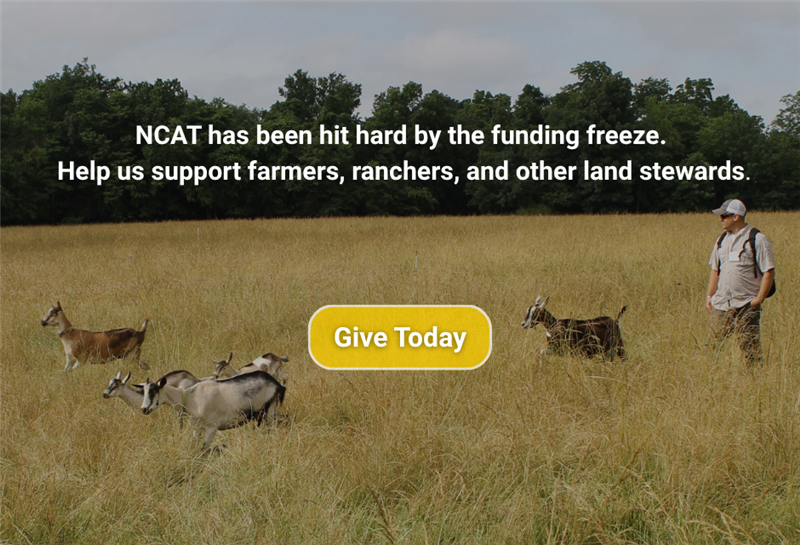Feeding Communities Impacted by the Pandemic
 Print This Post
Print This Post
By Kara Kroeger, NCAT Agriculture Specialist
The most amazing thing I have seen come out of the COVID-19 pandemic is our ability to adapt and mobilize into positive action, regardless of the circumstances. In record speed, in San Antonio, Texas, I saw a large number of organizations born or given new energy in order to respond to the national crisis in only a matter of weeks.
On April 9, 10,000 families showed up to the San Antonio Food Bank to get food, but they were only prepared for 6,000. In the first few weeks of COVID-19, I learned that San Antonio ranked number one in the country, according to the 2018 American Community Survey, for having the highest percentage of people living in poverty among the top 25 most populous metropolitan areas.
As people lose their jobs or continue to be furloughed, it’s apparent that there is a desperate need for more food distribution in my community. My position as a Sustainable Agriculture Specialist at NCAT is my bread, but my side gig as a private chef and nutritionist is my butter. Each of these positions has helped me develop an understanding of the local and national food system in a deep way. I quickly realized I wanted to use that knowledge to help San Antonio through the pandemic.
Bringing Bowls of Goodness to Those in Need
A number of friends, who are also women business owners in the community, had to close their businesses to comply with the city’s shelter-in-place orders and obviously were losing revenue. One of the businesses is a restaurant called The Good Kind, which had an idle commercial kitchen in which to cook. Two of us were chefs who wanted to contribute our culinary skills to serve the community, and the other four women wanted to generate some revenue while they were closed and, at the same time, help the community. We came up with an initiative called Be the Good Kind, a coalition of women business owners who joined forces to bring good food to good people.
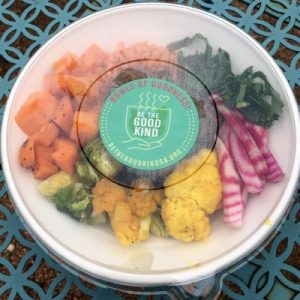
The Garden Bowl, which included a base of Forbidden black rice, roasted and pickled vegetables, grass-fed meatballs and dressing. Photo: Kara Kroeger
We agreed to donate the use of the commercial kitchen and our time as chefs to the coalition. We agreed that 15% of the revenue generated by selling gift cards for the temporarily shuttered businesses would go to fund Be the Good Kind. We also raised donations and eventually had masks made that are still generating revenue for the initiative. Along the way, we have collaborated with organizations that are in need of prepared meals. So far, we have delivered to healthcare professionals at hospitals, hospitality professionals who are out of work, and a number of organizations that help feed the homeless and others who are negatively affected by the pandemic.
People have been more than willing to contribute and this endeavor kept these businesses relevant in the community while they were shut down. Now, as many of them have reopened, they continue to generate donations for Be the Good Kind through promotions that donate a percentage of revenue to the initiative.
Through our connections in the local food community we also had 100 pounds of grass-fed beef donated by local producer Betsy Ross Grass-Fed Beef, and the main produce vendor at the restaurant has also given a deep discount on the vegetables we used in our meals.
Coming Together to Help Feed Communities
Obviously, the subject of this blog is not the usual agricultural information that you may be used to seeing from ATTRA. However, many of the people that read this blog are deeply involved and invested in their local food communities. It is my hope, that by sharing this one example with you, you might be inspired to involve yourself/business with a coalition such as this or create such an endeavor in your own city.
Unfortunately, this pandemic is far from over. As we continue to suffer economic losses, the need for community support within the realm of food will rise. When the newness of a crisis fades, the funding and donations often do too. This blog is a call for all of us to stay adaptable and action-focused when it comes to feeding our communities. Whether it is small-scale or large-scale does not matter. Each effort counts! Feeding even just one person one meal can have a profound impact in helping that person feel cared for enough to keep going another day. Let’s all keep doing our part to contribute innovative actions for resilience in our local food communities.
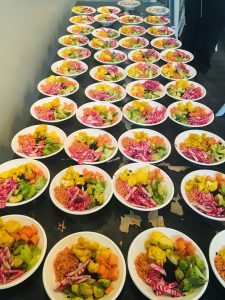
Photo: Kara Kroeger
Following is a list of ideas for farmers to consider as a means to help your local community:
- Donate farm surplus or a specific amount of production to a food bank or kitchen that supplies the community with food.
- Donate a percentage of your farm sales to a local food bank or organization that helps feed your local community. Be sure to advertise your donation on online platforms or at farmers markets where you vend. This could incentivize customers to buy from you.
- If you operate a food cooperative or hub, consider creating a number of foods to give away for free to people in need. People can register for them ahead of time on a first-come-first-served basis.
- Consider hosting a food drop-off site to donate to local food banks. For example, the number one item often needed by food banks is peanut butter. Could you host a socially distanced peanut butter drive at your farm stand, business, or home?
- If you have commercial kitchen space, can you offer the use of it for free to organizations in the community that serve prepared foods and need it to comply with food-safety rules?
- Could you offer crop harvesting jobs to furloughed staff of the restaurants you vend to? Many restaurant workers would be thrilled to help out on a farm as a temporary, independent contractor.
Additionally, if you have a story like this to share, Cornell University wants to know about it. Go to this link to share your story.
To learn more, contact Kara Kroeger directly karak@ncat.org or 479-587-3479.
This blog is produced by the National Center for Appropriate Technology through the ATTRA Sustainable Agriculture program, under a cooperative agreement with USDA Rural Development. ATTRA.NCAT.ORG.

